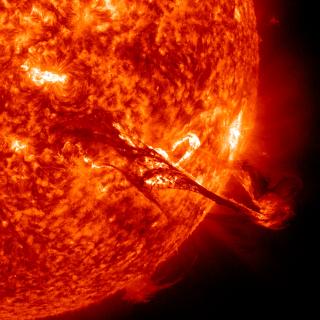Bibcode
Beck, C.; Bellot Rubio, L. R.; Kentischer, T. J.; Tritschler, A.; Del Toro Iniesta, J. C.
Referencia bibliográfica
Astronomy and Astrophysics, Volume 520, id.A115
Fecha de publicación:
9
2010
Revista
Número de citas
22
Número de citas referidas
18
Descripción
Context. Spectropolarimetry at high spatial and spectral resolution is a
basic tool to characterize the magnetic properties of the solar
atmosphere. Aims: We introduce the KIS/IAA Visible Imaging
Polarimeter (VIP), a new post-focus instrument that upgrades the TESOS
spectrometer at the German Vacuum Tower Telescope (VTT) into a full
vector polarimeter. VIP is a collaboration between the Kiepenheuer
Institut für Sonnenphysik (KIS) and the Instituto de
Astrofísica de Andalucía (IAA-CSIC). Methods: We
describe the optical setup of VIP, the data acquisition procedure, and
the calibration of the spectropolarimetric measurements. We show
examples of data taken between 2005 and 2008 to illustrate the potential
of the instrument. Results: VIP is capable of measuring the four
Stokes profiles of spectral lines in the range from 420 to 700 nm with a
spatial resolution better than 0farcs5. Lines can be sampled at 40
wavelength positions in 60 s, achieving a noise level of about 2 ×
10-3 with exposure times of 300 ms and pixel sizes of
0farcs17 × 0farcs17 (2 × 2 binning). The polarization
modulation is stable over periods of a few days, ensuring high
polarimetric accuracy. The excellent spectral resolution of TESOS allows
the use of sophisticated data analysis techniques such as Stokes
inversions. One of the first scientific results of VIP presented here is
that the ribbon-like magnetic structures of the network are associated
with a distinct pattern of net circular polarization away from disk
center. Conclusions: VIP performs spectropolarimetric
measurements of solar magnetic fields at a spatial resolution that is
only slightly worse than that of the Hinode spectropolarimeter, while
providing a 2D field field of view and the possibility to observe up to
four spectral regions sequentially with high cadence. VIP can be used as
a stand-alone instrument or in combination with other
spectropolarimeters and imaging systems of the VTT for extended
wavelength coverage.
Proyectos relacionados

Magnestismo Solar y Estelar
Los campos magnéticos son uno de los ingredientes fundamentales en la formación de estrellas y su evolución. En el nacimiento de una estrella, los campos magnéticos llegan a frenar su rotación durante el colapso de la nube molecular, y en el fin de la vida de una estrella, el magnetismo puede ser clave en la forma en la que se pierden las capas
Tobías
Felipe García